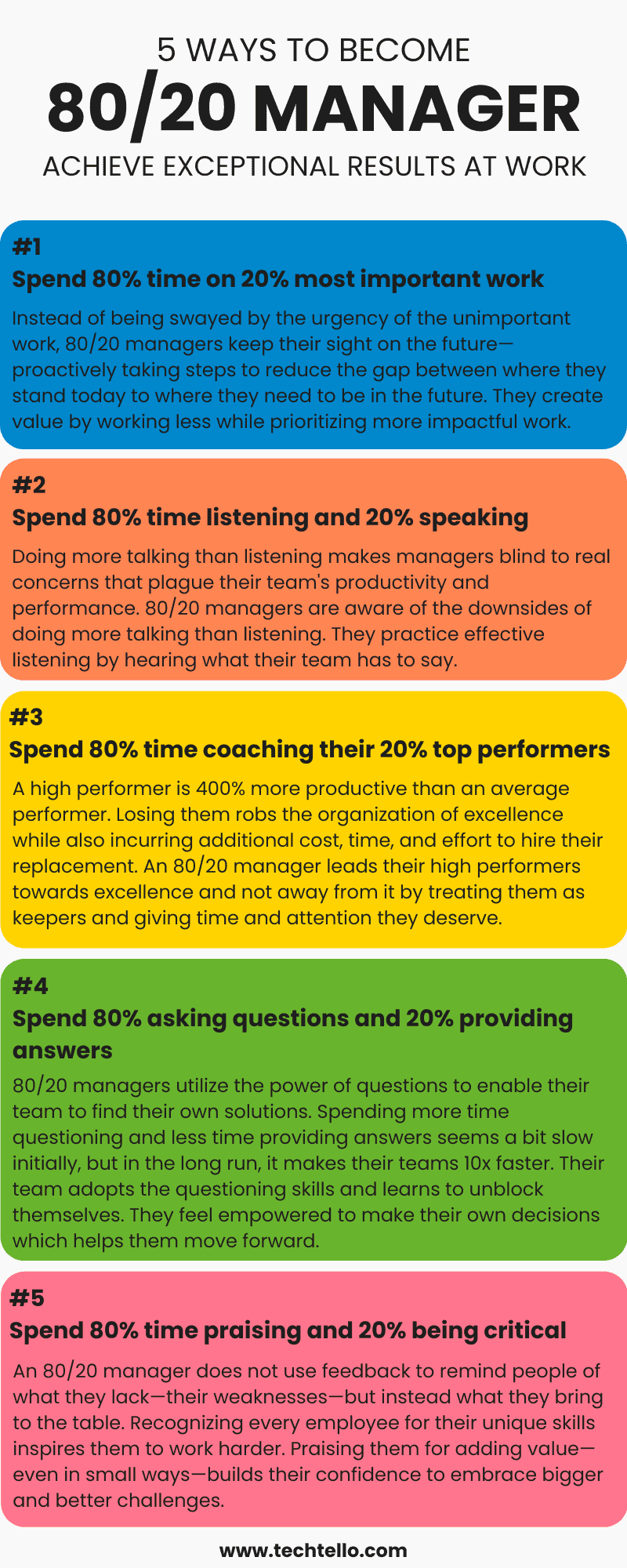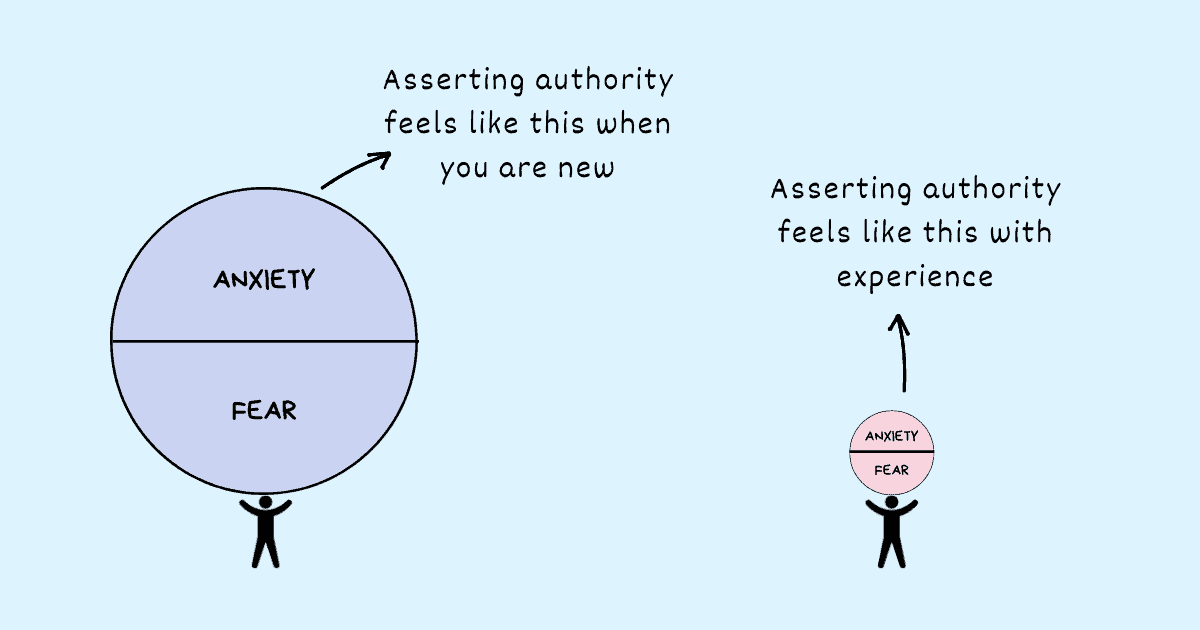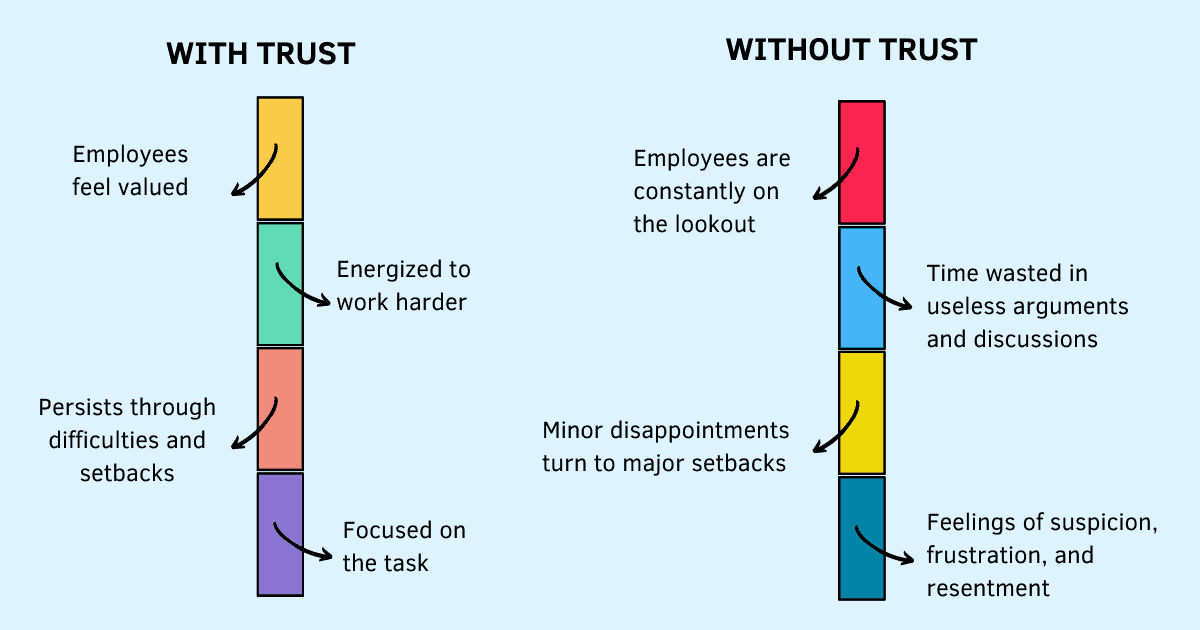How to Become an 80/20 Manager and Achieve Exceptional Results at Work
The Pareto principle states “80% of outcomes come from 20% of effort.” In other words, a significant portion of the work you put in goes to waste while a small part of it brings results.
Sociologist Vilfredo Pareto first discovered this principle by observing that 80% of the wealth in the UK came from 20% of the people. Since then Pareto principle has been found to be applicable in almost every aspect of our life:
80% of sales value is generated by 20% of products.
80% of the problems arise from 20% of the customers.
80% of the results are generated by 20% of the employees.
80% of all problems at work are caused by 20% of the co-workers.
Identifying that 20% is a big deal. Most managers get sucked into the daily chaos that comes with management responsibilities—back-to-back meetings, stakeholder responsibilities, putting out fires, and rush to meet deadlines. Without being intentional about where and how they spend their time, less time is spent doing impactful work and more is wasted on keeping busy.
80/20 managers don’t work this way. They apply the 80/20 rule to every aspect of their work. They prioritize work that will make a difference, eliminate work that gives an illusion of productivity and double down their efforts on work that actually moves them forward.
They achieve extraordinary results with ordinary effort. Applying the 80/20 principle helps them achieve exceptional results—without the stress of working long hours or getting caught up in the busyness from doing meaningless work.
However, as Richard Koch says in The 80/20 Principle “The 80/20 Principle is not a magic formula. Sometimes the relationship between results and causes is closer to 70/30 than to 80/20 or 80/1. But it is very rarely true that 50 percent of causes lead to 50 percent of results. The universe is predictably unbalanced. Few things really matter.”
As a manager, applying the 80/20 rule to these 5 important areas will not only give you the biggest returns but also lead to a successful and fulfilling career.
Spend 80% time on 20% most important work
D. Eisenhower, 34th president of the United States and one of America’s greatest military commanders said “What is important is rarely urgent, what is urgent is rarely important.”
80/20 managers understand this very well. Instead of being swayed by the urgency of the unimportant work, they keep their sight on the future—proactively taking steps to reduce the gap between where they stand today to where they need to be in the future.
Prioritizing work that matters multiplies the results they achieve. In principle:
- Do a few things and do them well.
- Focus on issues that matter and ignore the rest.
- Help their team identify tasks that will deliver the greatest results with the least effort.
- Attend meetings where their presence will matter.
To put the 80/20 rule to practice, they employ the Eisenhower productivity matrix. This is how it works:
- Important, Not Urgent: Involves future planning through strategic thinking. Requires initiative. 80/20 managers spend most of their time here.
- Important, Urgent: Deals with crisis management. 80/20 managers work hard to reduce time spent here by spending more time in #1.
- Not important, Urgent: Empower their team to take on higher-level responsibilities and do independent decision-making by delegating work.
- Not important, Not Urgent: Eliminate work that does not align with the company’s mission and goals.
Eisenhower Productivity Planner Worksheet
Organize your to-dos and clear out unnecessary tasks with the help of this powerful planner.
80/20 managers create value by working less while prioritizing more impactful work.
Spend 80% time listening and 20% speaking
Many managers make the mistake of speaking too much. Always telling their team what to do, directing them on every small issue, and giving unnecessary feedback may seem like a part of their job. It’s not!
They do it to feel in control. But doing more talking than listening makes them blind to real concerns that plague their team’s productivity and performance.
The more they speak, the less their people learn and grow.
The more they tell others what to do, the less their team feels empowered to make decisions.
The more they nitpick their team’s work, the less motivated they feel to produce great quality work.
80/20 managers are aware of the downsides of doing more talking than listening. They practice effective listening by hearing what their team has to say:
- What are their concerns?
- What blocks them from solving problems on their own?
- What ideas and opinions do they have?
- How can they make their own decisions?
- What kind of opportunities do people need?
- What feedback helps them improve?
Spending 80% time listening and 20% speaking leads to a win/win. Employees feel happy and valued when their ideas are heard and the manager gets access to information that empowers their team and enables them to grow.
Spend 80% time coaching their 20% top performers
A high performer is 400% more productive than an average performer. Losing them robs the organization of excellence while also incurring additional cost, time, and effort to hire their replacement.
“Talent is the multiplier. The more energy and attention you invest in it, the greater the yield. The time you spend with your best is, quite simply, your most productive time”, says Marcus Buckingham in First, Break All the Rules.
However, high performers in any organization aren’t easy to manage. Since they aren’t cut out for a normal growth path, the moment they sense a discrepancy between their journey and the direction in which their growth is headed, they lose interest in their work and start looking out.
With their uncanny ability to produce outstanding work and an appetite to solve tough problems, they demand even greater attention and engagement from their managers.
The 80/20 manager cares enough to not lose their high performers. They know that simply doing great work isn’t sufficient to keep their high performers inspired and committed to the job.
To manage their high performers well, an 80/20 manager spends 80% of their coaching time with 20% of their top performers. To enable this:
- They take time to understand their high performers beyond their wants and needs to what makes them unique.
- They don’t just assign them work. They show their top performers where they’re headed.
- They challenge them to steer their own ship and inspire them to deal with the storms along the way.
- Intellectual stimulation isn’t enough. High performers need an emotional connection to ideas. 80/20 managers do this through psychological investment—they make their high performers creators of their own path.
- They help them shine by giving them visibility beyond team boundaries.
- They enable fair distribution of work and do not treat their high performers as their default fallback option.
An 80/20 manager leads their high performers towards excellence and not away from it by treating them as keepers and giving time and attention they deserve.
Skip Level Meeting Questions + Template
Use these skip level meeting questions with indirect reports to bridge the gap, get a better perspective on how things are going and maintain a human connection with each person on your team.
Spend 80% asking questions and 20% providing answers
Finding answers to problems is a big part of a manager’s job. However, there’s a right and a wrong way to do it.
When your team is facing a challenge or when they don’t know how to do something, giving them the solution unblocks them temporarily. You may believe that you just saved their time. In reality, feeding them solutions makes them more and more dependent on you. They never develop the critical thinking skills required to navigate challenges at work.
80/20 managers utilize the power of questions to enable their team to find their own solutions:
- What issue are they facing?
- What solutions have they tried?
- What worked? What didn’t work?
- What other solutions are possible?
- How can they target a small win?
Spending more time questioning and less time providing answers seems a bit slow initially, but in the long run, it makes their teams 10x faster. Their team adopts the questioning skills and learns to unblock themselves. They feel empowered to make their own decisions which helps them move forward.
Spend 80% time praising and 20% being critical
Giving feedback to the team is an essential part of a manager’s role. But what if as a manager you’re overly critical?
Instead of recognizing your team’s effort and praising them for their accomplishments, obsessing about the one thing that does not meet your expectations is bound to lower your team’s morale. How can they be motivated to produce their best work when they’re constantly reminded that nothing they ever do is good enough?
An 80/20 manager does not use feedback to remind people of what they lack—their weaknesses—but instead what they bring to the table. Recognizing every employee for their unique skills—their strengths—inspires them to work harder. Praising them for adding value—even in small ways—builds their confidence to embrace bigger and better challenges.
This does not mean that they never criticize or refuse to point out areas where their team lacks, but giving constructive criticism is not their main focus, it’s only a small part of their strategy. Whether it’s positive feedback or sharing ideas on where their team members can do better, an 80/20 manager identifies feedback with the biggest impact and spends their time and energy in ensuring it’s delivered and received well.
While giving feedback:
- They do not undermine their team’s sense of control over their own performance by encouraging them to take responsibility for their actions.
- While sharing constructive criticism, they refrain from passing judgment and keep the discussion about the behavior and actions and never make it about who they’re as a person.
- They do not try to fix people or change them. Instead, they coach them to make the right decision for themselves.
- When praising, their praise is sincere and isn’t intended to manipulate others.
- They do not praise people for their intelligence. They praise them for trying new strategies, asking for help, and putting in the necessary effort.
- Their feedback is never vague. It can be connected to a specific behavior or action which enables the team to repeat positive behaviors and eliminate bad ones.
80/20 managers use feedback as a tool for growth by helping their team strengthen skills and abilities that will 10x their impact while ignoring weaknesses that do not get in the way of their success.
Summary
- The Pareto principle states that 80% of outcomes are generated from only 20% of effort. Optimizing this 20% and reducing the rest can lead to huge gains in results.
- 80/20 managers apply the Pareto principle to every aspect of their work. They focus on tasks, issues, and meetings that will deliver the biggest impact.
- They give 80% time and attention to 20% most important work. By applying the Eisenhower productivity matrix, they spend more time attending to work that’s important, reduce or delegate tasks that are urgent and eliminate work that shouldn’t be done at all.
- They spend 80% time listening to their team’s concerns, ideas and opinions. By speaking less and listening more, they’re able to increase their team’s productivity and performance.
- They spend 80% time coaching their 20% of top performers. Keeping their top performers effective and motivated leads to the biggest gains in results.
- They spend 80% asking questions and 20% providing answers. By helping their team identify their own solutions, they empower them to think independently and make their own decisions.
- They spend 80% time praising people and 20% being critical. By recognizing employees for their contributions and helping them get better, they enable their team to achieve more than they ever thought possible.






























